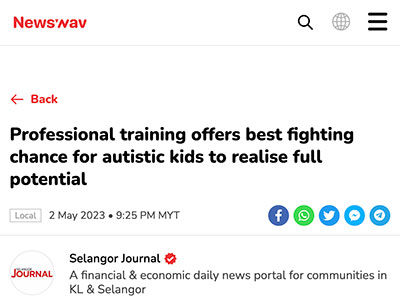
[Featured Article] Professional training offers best fighting chance for autistic kids to realise full potential
Published in: Newswav
Publication date: 2nd May 2023
KUALA LUMPUR, May 2 — Children with autistic spectrum disorder (ASD), including those from B40 households, will have the best fighting chance of achieving their full potential if the government insists on a certain level of professional training, particularly in education and the medical field.
Director of Early Autism Project (EAP) Malaysia Jochebed Isaacs said families with children with ASD need clarity on quality services available to them from the time their child is diagnosed, until adulthood.
“As such, we should have a more comprehensive long-term plan that maximises every child’s learning at every stage of their lives – from the early years with intensive therapy, right through to primary, secondary schooling and into adulthood.
“Children with ASD, which is a developmental disability caused by differences in a child’s brain, will have a place to go for clinical intervention and educational opportunities,” she told Bernama here today.
Being a spectrum disorder, some children will be more affected than others and might need lifelong support, said Jochebed, whose EAP provides individualised intensive behavioural treatment programmes to individuals with ASD.
Currently, in Malaysia, some 589 persons below 18 years of age have been diagnosed with ASD, up five per cent from 562 in 2021.
Jochebed said Malaysia has definitely made progress over the years and heading in the right direction towards inclusion and encouraging everyone to make Malaysia a more autism-friendly nation as there are already special education classes (PPKI) in many government schools.
Nevertheless, she urged the government and Ministry of Education to have special education skills taught to teachers in schools, so that they will know how to handle children with autism.
She said that, at present, due to limited resources, students of different learning levels and different special needs might be grouped together and this could be very challenging to maximise the learning of each individual student who has varying needs.
“Because of this, teachers will certainly need more support and training on how to effectively apply classroom management strategies and maximise learning especially of students with autism,” she said.
Jochebed said special education does require expertise which comes at a cost, especially ‘if we want to ensure adequate training and continued supervision in order to provide quality services.’
Malaysia should set a basic standard of quality of special education and instead of compromising quality, increase funding to ensure basic quality of support, she added.
At the same time, parents essentially need to have access to learn key strategies to work with their children, as many were unable to afford one-on-one services, but empowered parents could become their children’s one-on-one therapists as they are the ones with them 24/7.
This is a suggestion that government centres or private/corporate bodies could take up to empower parents in this area, Jochebed said.
— Bernama